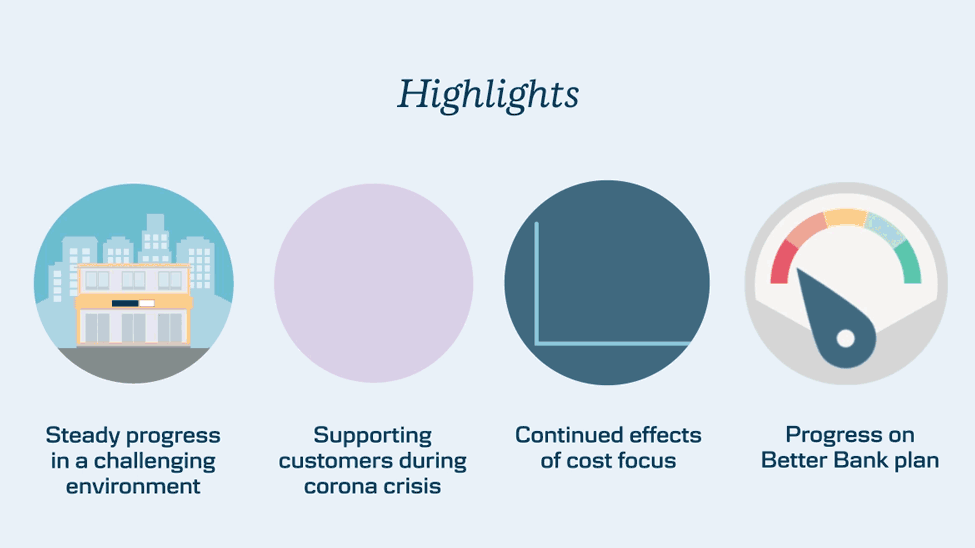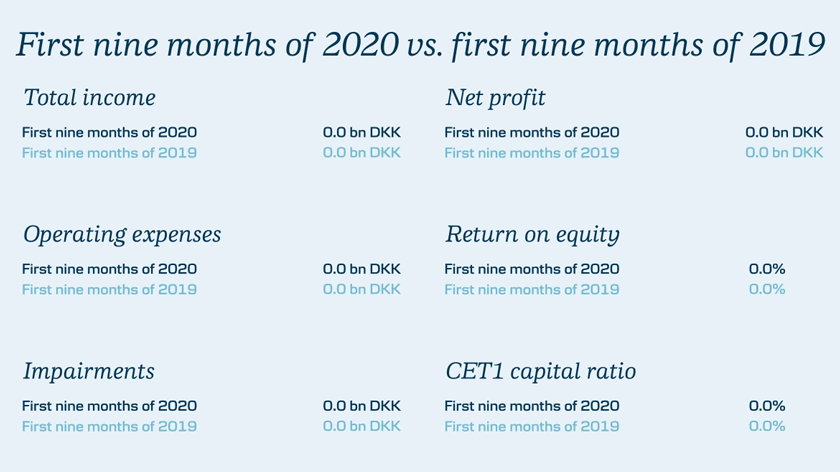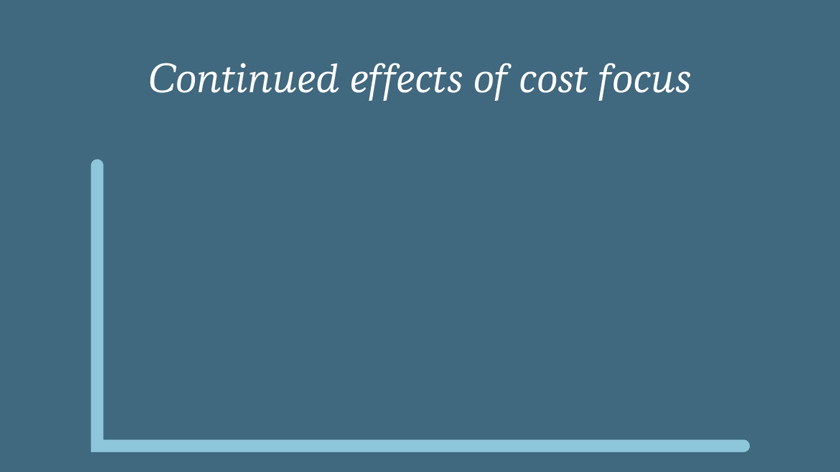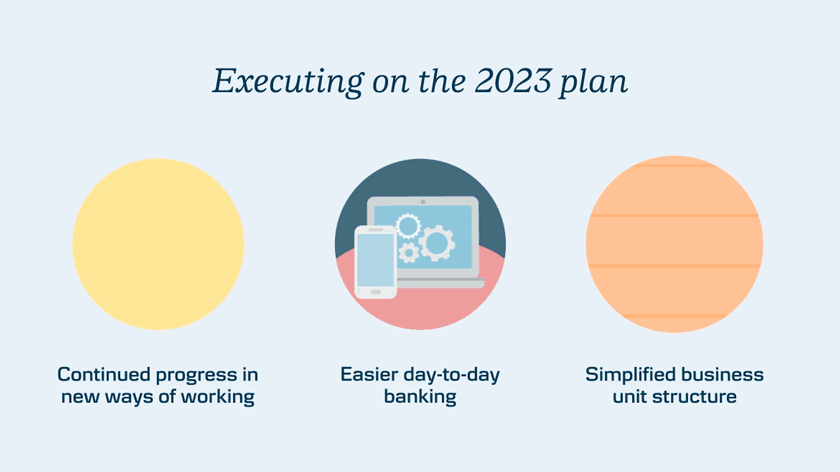


Nordic economies have held up relatively well
“We have seen a return of some of the restrictions introduced at the beginning of the pandemic, and there are still many uncertainties. We are, however, well prepared to support our customers as we have done throughout this period on the basis of strong analyses, relevant products, timely impairments and a proven and tested ability to work efficiently and serve our customers well,” says Chris Vogelzang.
Stable income in a challenging environment
“We saw good business activity in the first nine months of the year, despite lower economic activity in general. The drivers of income continue to be large corporate customers and Banking Nordic, where we see stable lending and good growth from our partnership agreements. But overall, our performance continues to be under pressure,” says Stephan Engels, CFO.

“The realisation of our 2023 plan and the continued transformation to become a simpler and more efficient bank is starting to have the necessary effect on costs. Danske Bank’s cost level is considerably higher than that of many of our competitors, and if we are to remain competitive towards our customers and offer them the best advisory services and products in a market characterised by intense competition with low margins and significant structural changes, we have to bring costs down,” says Stephan Engels.
Lower threshold for negative interest rates
“We continue to be in the extraordinary situation that negative interest rates have almost become the norm or at least will continue for a prolonged period of time. It would not be viable for this situation not to be reflected in our interest terms, and this is the reason why we choose to lower the threshold for applying negative interest rates to large deposits,” says Stephan Engels.
Developments in business units
-
In the first nine months of 2020, Banking DK launched several initiatives to support customers through the turmoil resulting from the corona crisis, and they have been well received. Banking DK continued to make progress on the journey towards becoming a better bank by launching a number of business initiatives, including the launch of a fixed-rate FlexLife® loan type. A new set-up for serving retail customers and a new offering to mass-affluent customers to be implemented in 2021 were also announced. In relation to commercial customers, Banking DK continued the efforts to become a strong strategic financial adviser. Profit before tax was, however, affected by the corona crisis.
-
Banking Nordic continued to support customers through the effects of the corona crisis. Furthermore, Banking Nordic continued to make progress in relation to the Better Bank transformation, most recently with the Better Nordic Retail Bank transformation initiative to create a stronger and more harmonised set-up for serving retail customers across the Nordic countries combined with an acceleration of our digital offerings. Despite the global turmoil, Banking Nordic experienced a large inflow of retail customers in Sweden and Norway in particular in the first nine months of 2020. In Norway, the value proposition for our partnership customers facilitated growth and in Sweden, we saw increased deposits in particular on the back of a successful migration of HSB partnership customers. Profit before tax was, however, affected by the corona crisis.
-
At Corporates & Institutions, total income increased 25% in the first nine months of 2020 amid high customer activity and market volatility. The increase was driven by improved net trading income, including positive value adjustments, and higher net interest income as a result of the credit facilities provided to support customers during the corona crisis and significantly higher deposit volumes. Corporates & Institutions continued to support customers with ESG transactions by providing support in the primary debt market to customers wanting to raise capital with a strong sustainable focus and by providing green loans. Profit before tax was negatively impacted by increased loan impairment charges against exposures in the oil and gas industry and increasing costs for compliance-related activities and the planned costs for the Better Bank transformation.
-
At Wealth Management, Danica Pension introduced its newest investment solution, Danica Balance Sustainable Choice, which gives customers the possibility of investing pension savings with an even stronger focus on sustainability. In addition, Danske Invest launched a new fund product called Danske Invest Global Sustainable Future, which invests in companies that have a leading role in the work towards a more sustainable future. Profit before tax amounted to DKK 1.5 billion, against DKK 1.7 billion in the first nine months of 2019, when adjusting for the DKK 1.3 billion gain from the sale of Danica Pension Sweden in 2019.
-
At Danske Bank Northern Ireland, profit before tax amounted to DKK 136 million in the first nine months of 2020, against DKK 648 million in the same period last year. This reflects higher loan impairment charges, sharply reduced UK interest rates and continued activity disruption as a result of the corona crisis. In a competitive marketplace, our service efforts continue to be recognised, with customer satisfaction rankings of no. 1 in both personal banking and business banking.

These initiatives will be supported by the already announced new business unit structure aimed at becoming a less complex and more competitive bank, as well as the establishing of a new Commercial Leadership Team to drive our commercial and customer agenda.
We continued to make tangible progress in a number of areas, including compliance remediation, societal impact initiatives and new ways of working. This next step will break down silos in our organisation and will link directly to the ongoing radical changes to how we work – one of the key initiatives in the Better Bank plan. The combination of a simpler organisation and a more agile setup directed towards business development will increase our execution power, achieve a faster time to market and realise synergies across our operations, all aimed at becoming even more competitive for our customers.
Chris Vogelzang
Outlook for 2020
“We have raised our guidance for net profit for the full year based on generally improved developments in the financial markets, continually good progress in the underlying business as well as lower costs,” says Stephan Engels.
The outlook is subject to uncertainty and depends on economic conditions, including government support packages.

Contact
Stefan Singh Kailay, Head of Media Relations
Tel. +45 45 14 14 00
Related news
.png?h=128&iar=0&w=128&rev=c0456076148343a69ec27218e9fa39aa&hash=5367D3AD7CFBE8E78181A6587FAB2790)

